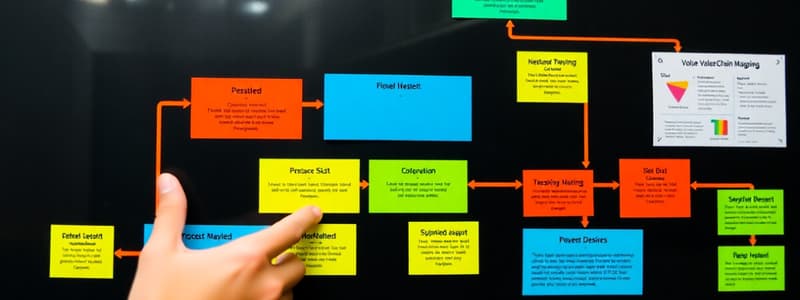Podcast
Questions and Answers
What is the primary shift in structure according to the described concepts?
What is the primary shift in structure according to the described concepts?
- From high volume and flexibility to standardization
- From low volume to high volume with flexibility
- From low volume and high flexibility to higher volumes and more standardization (correct)
- From high volume and low flexibility to low volume and high standardization
What effect does off-diagonal positioning strategy have on a company?
What effect does off-diagonal positioning strategy have on a company?
- It leads to uniformity in offerings
- It encourages a focus on low-cost production
- It reduces its competitiveness
- It allows for differentiation from competitors (correct)
Which of the following is a benefit of off-diagonal positioning strategies?
Which of the following is a benefit of off-diagonal positioning strategies?
- Increased reliance on standardized processes
- Enhanced capability for mass-customization (correct)
- Elimination of competitive advantages
- Reduction in product variety
Which of the following metrics would be most relevant when analyzing the performance of a business adopting mass-customization strategies?
Which of the following metrics would be most relevant when analyzing the performance of a business adopting mass-customization strategies?
In the context of strategic design choices, which factor is emphasized for effective differentiation?
In the context of strategic design choices, which factor is emphasized for effective differentiation?
What key concept is associated with moving businesses towards higher volumes while increasing standardization?
What key concept is associated with moving businesses towards higher volumes while increasing standardization?
Which of the following best describes the trend of companies towards off-diagonal positioning?
Which of the following best describes the trend of companies towards off-diagonal positioning?
When assessing strategic design choices, which outcome is most likely from a shift to higher volumes with standardization?
When assessing strategic design choices, which outcome is most likely from a shift to higher volumes with standardization?
What is the primary focus of a value stream map?
What is the primary focus of a value stream map?
Which method is NOT part of mistake-proofing processes?
Which method is NOT part of mistake-proofing processes?
What does 'Poka-Yoke' primarily aim to achieve in processes?
What does 'Poka-Yoke' primarily aim to achieve in processes?
Why is process design critical to an efficient value chain?
Why is process design critical to an efficient value chain?
Which of the following activities is most closely associated with value-added activities?
Which of the following activities is most closely associated with value-added activities?
Which process choice is characterized by a product designed to meet specific customer specifications in small quantities?
Which process choice is characterized by a product designed to meet specific customer specifications in small quantities?
What is the purpose of incorporating costs into a value stream map?
What is the purpose of incorporating costs into a value stream map?
What is a primary characteristic of Standard (Make-to-Stock) processes?
What is a primary characteristic of Standard (Make-to-Stock) processes?
Which of the following best describes a strategic choice in process design?
Which of the following best describes a strategic choice in process design?
In which process choice does a customer select from a limited set of configurations?
In which process choice does a customer select from a limited set of configurations?
Process design decisions primarily impact which of the following areas?
Process design decisions primarily impact which of the following areas?
How does identifying defects soon after they occur benefit a process?
How does identifying defects soon after they occur benefit a process?
What is the relationship between process mapping and value stream mapping?
What is the relationship between process mapping and value stream mapping?
Which of the following is NOT a principle process type discussed?
Which of the following is NOT a principle process type discussed?
Performance metrics in process design analyze which of the following?
Performance metrics in process design analyze which of the following?
Which decision is NOT aligned with the principles of strategic design choices in operations management?
Which decision is NOT aligned with the principles of strategic design choices in operations management?
Flashcards
Structure Shift
Structure Shift
A change in business structure, moving from flexible low-volume operations to standardized high-volume operations.
Positioning Strategy
Positioning Strategy
A business strategy that places a company outside the typical range of competitor strategies.
Off-Diagonal Positioning
Off-Diagonal Positioning
A strategic approach where a business establishes itself distinct from the common industry standards.
Mass-Customization
Mass-Customization
Signup and view all the flashcards
Standardization
Standardization
Signup and view all the flashcards
Differentiation
Differentiation
Signup and view all the flashcards
High Volume
High Volume
Signup and view all the flashcards
Flexibility
Flexibility
Signup and view all the flashcards
Process Choice Decisions
Process Choice Decisions
Signup and view all the flashcards
Custom (Make-to-Order)
Custom (Make-to-Order)
Signup and view all the flashcards
Option (Assemble-to-Order)
Option (Assemble-to-Order)
Signup and view all the flashcards
Standard (Make-to-Stock)
Standard (Make-to-Stock)
Signup and view all the flashcards
Process Design
Process Design
Signup and view all the flashcards
Mistake-Proofing Processes
Mistake-Proofing Processes
Signup and view all the flashcards
Value Chain
Value Chain
Signup and view all the flashcards
Process Mapping
Process Mapping
Signup and view all the flashcards
Value Stream
Value Stream
Signup and view all the flashcards
Value Stream Map
Value Stream Map
Signup and view all the flashcards
Poka-Yoke
Poka-Yoke
Signup and view all the flashcards
Poka-Yoke: Prediction
Poka-Yoke: Prediction
Signup and view all the flashcards
Poka-Yoke: Detection
Poka-Yoke: Detection
Signup and view all the flashcards
Process Design Goal
Process Design Goal
Signup and view all the flashcards
Process Design Impact
Process Design Impact
Signup and view all the flashcards
Study Notes
Operations and Supply Chain Management, 2e
- Chapter 7a and 7b cover Process Selection, Design, and Improvement
- Learning Outcomes include identifying and defining process choice decisions, principle process types, and relationships between them.
- Students should also understand differentiating process design, process mapping, and value stream mapping.
- Additional learning outcomes include identifying Product Life Cycle (PLC) phases, interpreting the Product-Process Matrix, and the Service-Positioning Matrix
Processes
- Process choice and design are crucial for efficient value chains.
- Process design significantly affects operational costs, customer satisfaction, and sustainability.
- Key decisions include process choice, design, and mistake-proofing.
Process Choice Decisions
- Custom (Make-to-Order): One-of-a-kind or small-quantity production tailored to customer specifications (e.g., custom cabinets)
- Option (Assemble-to-Order): Combining standard parts, sub-assemblies, or services to create customer-configured products (e.g., semi-custom cabinets)
- Standard (Make-to-Stock): Pre-designed products without customer options (e.g., pre-made cabinets)
Principle Process Types
- Projects: Large-scale, customized initiatives with many coordinated tasks to finish on time and within budget
- Job Shops: Organized around specialized equipment to customize work for individual customers; good for wide variety of goods/services in small quantities.
- Flow Shops: Organized around a fixed sequence of activities/steps to produce a limited variety of similar goods/services (e.g., assembly lines).
- Continuous Flow: Highly standardized goods/services in very high volumes; usually 24/7 use highly specialized/automated equipment.
Process Design
- The goal is to combine optimal equipment, labor, software, work methods, and environment to satisfy customer needs.
- Design considerations impact cost, flexibility, and quality.
- Process design happens at hierarchical levels (tasks, activities, processes, and value chains).
- Value Stream Mapping: A valuable tool that describes both current and proposed process flows.
- Defining process purpose and objectives
- Creating detailed process/value stream maps
- Evaluating alternative process designs
- Identifying performance measures
- Selecting appropriate equipment/technology
- Developing implementation plans
Mistake-Proofing Processes
- Humans make mistakes; mistake-proofing practices (Poka-Yoke) are vital.
- Mistake-proofing occurs through process design and includes:
- Design defects out of the process
- Identifying and preventing defects before they occur
- Quick correction after defects occur
Matrices Comparison (Similarities)
- Superior performance generally occurs when remaining close to the matrices' diagonal.
- Moderate portions of the matrices feature a wide variety of intermediate design choices.
- Venturing far off the diagonal may hinder a company's achievements
Product Life Cycle (PLC)
- A characterization of product growth, maturity, and decline over time.
- Understanding the PLC is crucial because goods/services' processes and value chains must adapt with changes in the PLC
Product-Process Matrix
- A model describing the alignment of process choice with manufactured good characteristics.
- The matrix merges product lifecycle with process lifecycle.
- The matrix is a guide for choosing the most appropriate manufacturing process based on product volume/characteristics.
Service-Positioning Matrix
- A model describing the relationship between service encounter levels and management service design to meet customer needs.
- Pathways can be customer-routed or provider-routed depending on the level of customer interaction.
- Matrix depicts the tradeoff between high customer freedom versus high repeatability.
Chapter 7a and 7b Summary
- Understanding process choice, selection, and design (from both a manufacturing and service perspective) is important to make effective managerial decisions and improve efficiency.
Studying That Suits You
Use AI to generate personalized quizzes and flashcards to suit your learning preferences.
Related Documents
Description
This quiz focuses on Process Selection, Design, and Improvement as covered in Chapters 7a and 7b of Operations and Supply Chain Management, 2e. Students will explore key concepts like process choice decisions, process types, design mapping, and the Product-Process Matrix. Test your knowledge on how these elements impact value chains and operational efficiency.




